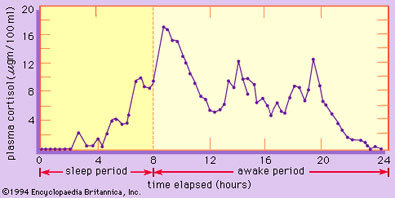
Cortisol, also known as the stress hormone, is a steroid hormone (specifically, a glucocorticoid) produced by the adrenal glands. It is responsible for responding to both physical and emotional stress, and plays a key role in a number of essential physiological functions.
Elevated cortisol levels can often indicate high levels of stress. With stress on the rise, and the majority of Americans reporting being stressed out, elevated cortisol is becoming increasingly common. Like other hormones, there is an optimal range that cortisol levels should fall within. Both elevated cortisol levels (hypercortisolism), and low cortisol levels (hypocortisolism), can negatively impact your health.
Cortisol functions
Cortisol is a crucial hormone in the body, and is involved in regulating a number of significant functions, such as:
- Proper glucose metabolism
- Activating anti-stress and anti-inflammatory pathways
- Immune system suppression, Glycogenolysis (the process of breaking down stored glycogen to usable glucose)
- Aiding in fat, protein, and carbohydrate metabolism
- Central nervous system activation
- Maintaining and regulating blood pressure
Hydrocortisone, the synthetic form of cortisol, is a medication used to reduce inflammation. Topical hydrocortisone is often used to treat skin irritations and conditions, and oral hydrocortisone is used to treat various conditions, such as arthritis, intestinal disorders, and immune system cancers (including lymphoma and leukemia).
The dangers of high cortisol
In the past, this stress mechanism served us well. After a stressful event occurs, however, it is important for the body’s functions to return to normal, and for relaxation responses to be reactivated. But in today’s world, so many different stressors are constantly activating cortisol cascades. This causes our bodies often remain in high-stress states for extended periods of time. When we are chronically stressed, the body continuously releases cortisol, resulting in a number of potential health problems, including:
- Anxiety
- Increased blood pressure
- Blood sugar imbalances
- Decrease in bone density
- Depressed mood
- Digestive problems
- Heart disease
- Weakened immune system
- Impaired memory
- Diminished learning and cognitive performance
- Loss of muscle tissue
- Sleep problems
- Reduced thyroid function
- Slowed wound healing
- Weight gain
Chronically low levels of cortisol are uncommon, but may indicate serious health problems. Seek the advice of a physician if your cortisol levels are low.
Cortisol’s cycle
In humans, cortisol levels follow a circadian rhythm, with levels rising and falling throughout the day, and repeating on a 24-hour cycle. From day-to-day, depending on different events (of varying stressors) that may occur, levels can vary.
Peak levels of cortisol generally occur between 6:00 to 8:00 AM. 30 to 60 minutes after awakening, there is a surge of cortisol secretion.
The best time to have your blood cortisol level tested is around 8 AM, or soon after rising, following an overnight fast. The lowest levels of cortisol occur around midnight, or about 2 to 4 hours after falling asleep.

What can you do about it?
Fortunately, lifestyle modifications and stress management techniques can play a significant role in controlling cortisol levels. Identifying how you respond to stress, as well as your personal stressors and relaxants is important.
Consider the following tips for coping with stress:
- Exercise regularly
- Eat a healthy diet (think whole foods!) with consistent meal timing
- Get sufficient sleep and rest
- Maintain positive and healthy relationships
- Practice relaxation through yoga, meditation, breathing exercises, listening to music, or laughing
- Reduce or eliminate alcohol and caffeine intake
Taking the test
Keep in mind that there are a number of factors that may influence blood cortisol levels. Individuals taking steroid medications, or women who are pregnant or taking estrogen or oral contraceptives may have increased cortisol levels. A recent injury, illness, surgery, or infection, as well as participating in strenuous exercise 24-hours prior to a blood test can also cause high blood cortisol.
Cortisol is a vital hormone involved in a multitude of our bodies’ most crucial functions. The many problems that result from chronically elevated cortisol can impact both physical and mental well-being. The best way to begin managing your cortisol and stress is to have your blood analyzed through InsideTracker. You will be able to determine your cortisol level, and more importantly, receive relevant, personalized, and science-based recommendations to optimize your performance and overall health.
Learn how your biomarkers affect your body in this FREE e-Book download!
Some other blog posts we think you'll love:



